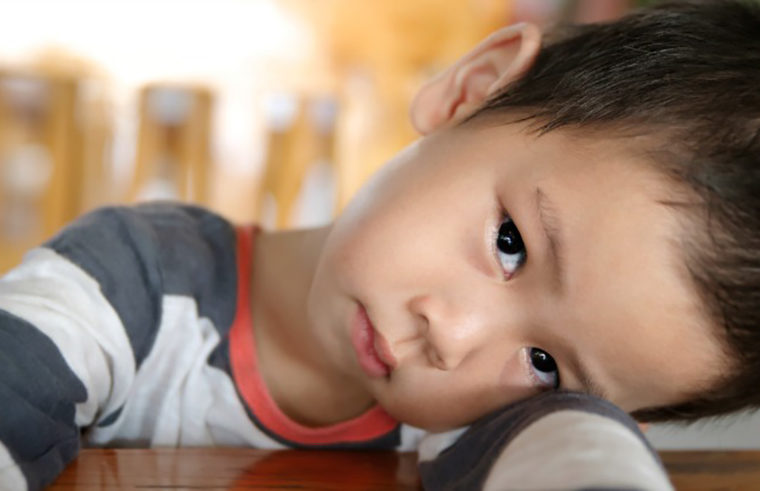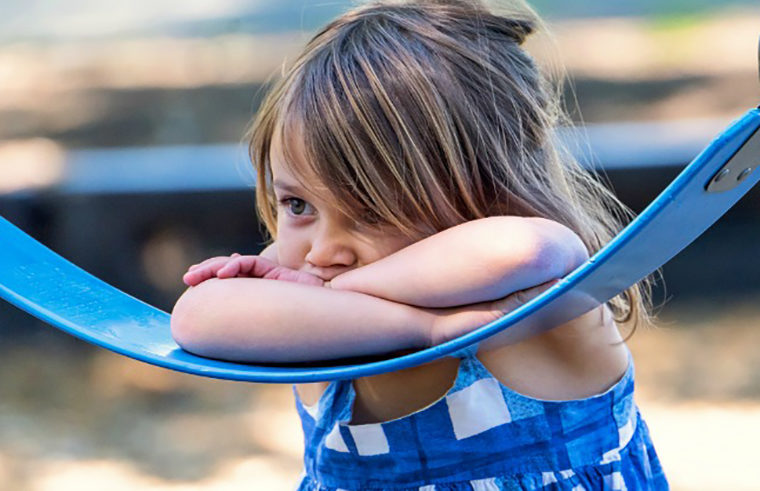We all experience worry from time to time, but anxiety is different. If left unchecked, anxiety can become a lifelong condition. By picking up on the clues that your child may be suffering with anxiety, you can take steps now that will help her to manage it.
What is childhood anxiety?
Being fearful of things like the toilet flushing or having someone other than you care for her are common in early childhood, but this goes one step further for anxious little ones. Not only does she feel scared, but she also perceives the fear or danger to be much greater than it actually is. Thinking about the situation makes her more worried and tense, too.
A little one with anxiety will often try avoiding situations that distress her, or will wait for you to step in and manage the situation for her. While this ‘avoidance behaviour’ eases her anxiety in the short term, it can actually work against her in the long term. Not only will she be less likely to be able to cope or manage it next time, she’ll also find it harder to deal with everyday stresses at preschool, home and future settings such as school and then the workplace.

Spotting the signs
The symptoms of anxiety in children aren’t clearcut but anxious little ones might:
- seek reassurance often
- avoid situations they feel worried or scared about
- try to get others to do the things they are worried about
- dislike taking risks or trying new things
- have lots of fears
- get upset easily
- have lots of worries
- she may also have physical symptoms such as sleeplessness, diarrhoea, stomach aches and headaches
- she can have difficulty concentrating and be more tired than usual
While it’s important to remember that most young children experience separation anxiety and normal childhood fears, in addition to this children with anxiety may also:
- cling to you a lot
- seek help for things she can do for herself
- be reluctant to get ready for kindy or school
- refuse to go to sleep without you or her dad
- complain of tummy pains or headaches
- worry a lot about doing things right
- prefer to watch her friends do something rather than have a go herself
- be scared a lot of the time
- cry often over small things
- always see the dangerous or negative side of things
Early intervention is key
When it comes to anxiety, early intervention can really help. Early intervention means taking action as early as possible to ensure better future outcomes. Research has shown that dealing with childhood anxiety as soon as possible can be hugely beneficial. By giving your little one the skills and strategies to cope with her anxiety, she will carry these throughout life.

How you can help your anxious little one
When your child experiences anxiety, it’s natural to want to step in and solve the problem. If she’s scared of dogs, for instance, your instinct is to pick her up every time she passes one when out for a walk. But this only reinforces her anxiety and doesn’t help her develop coping skills. The best thing you can do for your anxious child is not to throw her in the deep end (say by visiting a dog park!) but to teach her how to cope with her anxiety so it doesn’t get in the way of her enjoying life.
10 strategies to try
1. First calm her down
Soothe your little worrier before you try talking to her.
2. Have worry time
Encourage your little one to voice her worries by having ‘worry time’ each day. Talk to her about what’s on her mind so she can release it. You could make this fun by having a ‘worry box’ she can decorate it in stickers and then post her worries away.
3. Little steps
Try breaking her worries down into manageable steps with an end goal. For example, if your child is afraid of water and swimming, you could start out by watching other kids swimming, then move on to sitting on the edge of the pool, then standing in the water at the shallow end and then to eventually to learning to swim.
4. Encourage positive thinking
Help your little one shift negative ‘what if?’ thinking patterns by reminding her of times she’s dealt with similar issues in the past and how things worked out OK. Help her to challenge scary thoughts with facts, such as we know monsters aren’t real.
5. Have a go
Encourage your child to ‘have a go’ when she doesn’t feel like it. Talk to her about how it’s fun to try and that it doesn’t matter if something’s a success or failure.
6. Be a role model
If you are also prone to anxiety, show your little one how you overcome your fears. For example, you might say, “This looks a bit scary, but I’ll give it a go.”
7. Let her take the lead
Give your little one some control over managing her anxiety. For example, if she’s afraid of the dark, make turning on her night light part of her bedtime routine.
8. Be open and honest about her fears
Talk through her fears and answer any questions she may have about them truthfully. By explaining what’s what, you will be putting her fears in perspective.
9. Look in the mirror
Have a think about the messages you’re sending your child. Does your over-protectiveness reinforce the fear that the world is a dangerous place where she can get hurt, for instance? If you’re prone to ‘helicoptering’, try not to always jump in. Figuring things out herself will help her to build resilience.
Chat to your GP
If your little one’s anxiety is causing her difficulties, speak to your family doctor about what’s going on. She may refer you on to a clinical psychologist who can do further early intervention work.
Article by:










